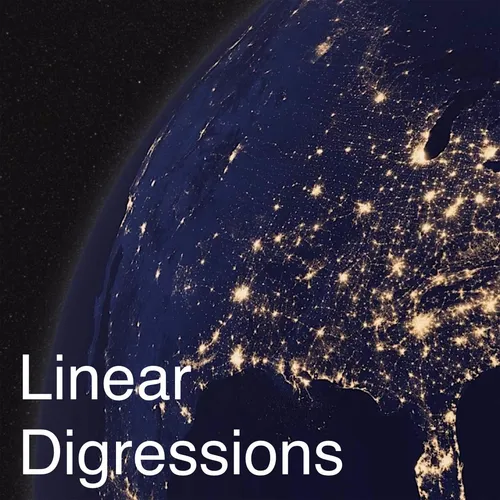
Linear Digressions
In each episode, your hosts explore machine learning and data science through interesting (and often very unusual) applications.
- Update frequency
- every 6 days
- Average duration
- 19 minutes
- Episodes
- 291
- Years Active
- 2014 - 2020

Scikit + Optimization = Scikit-Optimize
We're excited to welcome a guest, Tim Head, who is one of the maintainers of the scikit-optimize package. With all the talk about optimization lately, it felt appropriate to get in a few words with …
00:15:41 |
Mon 12 Sep 2016

Two Cultures: Machine Learning and Statistics
It's a funny thing to realize, but data science modeling is usually about either explainability, interpretation and understanding, or it's about predictive accuracy. But usually not both--optimizing…
00:17:29 |
Mon 05 Sep 2016

Optimization Solutions
You've got an optimization problem to solve, and a less-than-forever amount of time in which to solve it. What do? Use a heuristic optimization algorithm, like a hill climber or simulated annealing…
00:20:07 |
Mon 29 Aug 2016

Optimization Problems
If modeling is about predicting the unknown, optimization tries to answer the question of what to do, what decision to make, to get the best results out of a given situation. Sometimes that's straig…
00:17:50 |
Mon 22 Aug 2016

Multi-level modeling for understanding DEADLY RADIOACTIVE GAS
Ok, this episode is only sort of about DEADLY RADIOACTIVE GAS. It's mostly about multilevel modeling, which is a way of building models with data that has distinct, related subgroups within it. Wha…
00:23:34 |
Mon 15 Aug 2016

How Polls Got Brexit "Wrong"
Continuing the discussion of how polls do (and sometimes don't) tell us what to expect in upcoming elections--let's take a concrete example from the recent past, shall we? The Brexit referendum was,…
00:15:14 |
Mon 08 Aug 2016

Election Forecasting
Not sure if you heard, but there's an election going on right now. Polls, surveys, and projections about, as far as the eye can see. How to make sense of it all? How are the projections made? Whi…
00:28:59 |
Mon 01 Aug 2016

Machine Learning for Genomics
Genomics data is some of the biggest #bigdata, and doing machine learning on it is unlocking new ways of thinking about evolution, genomic diseases like cancer, and what really makes each of us diffe…
00:20:22 |
Mon 25 Jul 2016

Climate Modeling
Hot enough for you? Climate models suggest that it's only going to get warmer in the coming years. This episode unpacks those models, so you understand how they work.
A lot of the episodes we do…
00:19:49 |
Mon 18 Jul 2016

Reinforcement Learning Gone Wrong
Last week’s episode on artificial intelligence gets a huge payoff this week—we’ll explore a wonderful couple of papers about all the ways that artificial intelligence can go wrong. Malevolent actors…
00:28:16 |
Mon 11 Jul 2016

Reinforcement Learning for Artificial Intelligence
There’s a ton of excitement about reinforcement learning, a form of semi-supervised machine learning that underpins a lot of today’s cutting-edge artificial intelligence algorithms. Here’s a crash c…
00:18:30 |
Sun 03 Jul 2016

Differential Privacy: how to study people without being weird and gross
Apple wants to study iPhone users' activities and use it to improve performance. Google collects data on what people are doing online to try to improve their Chrome browser. Do you like the idea of…
00:18:17 |
Mon 27 Jun 2016

How the sausage gets made
Something a little different in this episode--we'll be talking about the technical plumbing that gets our podcast from our brains to your ears. As it turns out, it's a multi-step bucket brigade proc…
00:29:13 |
Mon 20 Jun 2016

SMOTE: makin' yourself some fake minority data
Machine learning on imbalanced classes: surprisingly tricky. Many (most?) algorithms tend to just assign the majority class label to all the data and call it a day. SMOTE is an algorithm for manufa…
00:14:37 |
Mon 13 Jun 2016

Conjoint Analysis: like AB testing, but on steroids
Conjoint analysis is like AB tester, but more bigger more better: instead of testing one or two things, you can test potentially dozens of options. Where might you use something like this? Well, if…
00:18:27 |
Mon 06 Jun 2016

Traffic Metering Algorithms
This episode is for all you (us) traffic nerds--we're talking about the hidden structure underlying traffic on-ramp metering systems. These systems slow down the flow of traffic onto highways so tha…
00:17:30 |
Mon 30 May 2016

Um Detector 2: The Dynamic Time Warp
One tricky thing about working with time series data, like the audio data in our "um" detector (remember that? because we barely do...), is that sometimes events look really similar but one is a lit…
00:14:00 |
Mon 23 May 2016

Inside a Data Analysis: Fraud Hunting at Enron
It's storytime this week--the story, from beginning to end, of how Katie designed and built the main project for Udacity's Intro to Machine Learning class, when she was developing the course. The pr…
00:30:28 |
Mon 16 May 2016

What's the biggest #bigdata?
Data science and is often mentioned in the same breath as big data. But how big is big data? And who has the biggest big data? CERN? Youtube?
... Something (or someone) else?
Relevant link: h…
00:25:31 |
Mon 09 May 2016

Data Contamination
Supervised machine learning assumes that the features and labels used for building a classifier are isolated from each other--basically, that you can't cheat by peeking. Turns out this can be easier…
00:20:58 |
Mon 02 May 2016
Disclaimer: The podcast and artwork embedded on this page are the property of Ben Jaffe and Katie Malone ([email protected]). This content is not affiliated with or endorsed by eachpod.com.